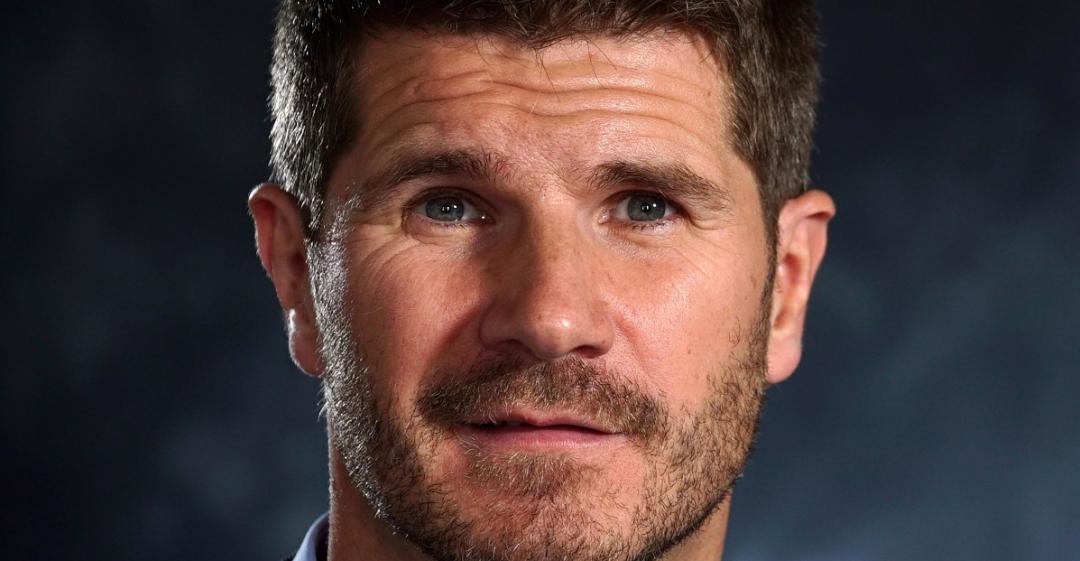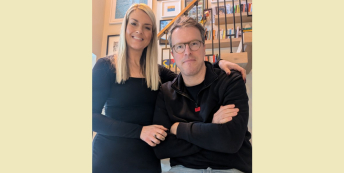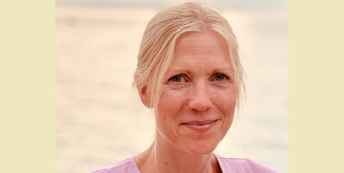“I was living life at such a furious pace; I needed to step off the treadmill.”

Newly Updated
What work were you doing previously?
I worked at Google for ten years.
I went into Google Enterprise, which at the time was just a handful of us who'd been headhunted to work together, because we'd all been successful in the roles we'd occupied previously. There was no product, no contract, no clients, just a place from which to build a business – and it was great fun.
I ran the UK and Ireland side of the business, then took on northern, central and eastern Europe and eventually all the global partnerships, bringing in all of the indirect revenue.
What are you doing now?
I'm founder and CEO of Temporall, a team of world-leading experts in organisational culture and performance.
Why did you change?
I'd always wanted to be a CEO, and I'd become quite aware that probably wasn't going to happen where I was.
I always wanted to learn more. On the one side there was the thought of career progression, financial security and everything, but then there was this other part of me that wanted to progress in a non-linear fashion.
Google has over 600 products, so there was always an opportunity to learn different things, but I think I was always ultra-aware that I wanted to do something else.
Maybe four or five years ago, I worked with an executive coach. I asked Google to get me an external coach because I wanted a different set of optics. He was fantastic. I did a year's coaching sessions, and over that period of time, I realised I was starting to ask and answer my own questions.
When was the moment you decided to make the change?
I wasn't one of those people who had that light-bulb moment of sudden realisation.
It was more like a collection of different things that were swimming about for eight months.
Things started to formulate for me around the idea of organisational culture; it was something I'd been talking to CEOs and CFOs about. So many of the conversations I had ended up in a cul de sac around questions of trying to be different, trying to compete, trying to be unique, especially in the digital transformation area.
So much of it came back to culture, and this is really becoming recognised – that an outstanding business culture will lead to an outstanding business performance. That's what I learned at Google, and that's why they're successful. I was lucky enough to experience that, so I can talk about it and I understand it.
I sat back and wondered if it was possible for organisational culture to be deconstructed and then reconstructed to make it super accessible. Just as technology has become democratised, I was interested if that could happen here.
That was my initial business seed idea.
How did you choose your new career?
When you're on the work treadmill the hardest thing is to take some time out for family or for what you want to do.
I hadn't allowed myself that for 20 years. Once I had that time, coupled with the coaching and the business idea, it was only a matter of time before I swallowed the brave pill.
For me that became a very natural progression around two years ago. I felt I was at the right age, I had the energy to go for it, and I was really well connected with a lot of awesome people. I negotiated eight months' gardening leave. I'd been at Google for ten years and I was ready to do something different, something new.
I'd been approached by other big technology companies to run various other big businesses. So, the way I saw it, I could either go do that, do something linear with another company, or be brave and do something completely different on my own.
Frankly, it was only ever going to be the latter.
Are you happy with the change?
I've never been happier.
And that's not to sound trite. I feel so much more like I'm off the treadmill.
When you're in corporate life, and you're doing well, and the company is doing well, it takes its toll over the years. It catches up with you emotionally and physically. I was living life at such a furious pace; I needed to step off that treadmill, and I'm glad that I did.
I've learned so much about running a business as a result of that. I wasn't going to be the CEO of Google, but I am the CEO of my own business now which is awesome. I'm learning every day; I'm working with great people; I'm naturally optimistic anyway, but I know I have a world class team that's adding value to our clients' businesses.
What do you miss and what don't you miss?
I miss the people, nothing else.
How did you go about making the shift?
The eight months' gardening leave gave me time to think about the idea that I wanted to bring to life.
So, for that eight months, I honestly think I only took one proper day off – the rest of the time I was thinking about, trying to design, and meeting loads of different people to talk about this idea.
Having eight months of not being on the work treadmill was a great gift. I worked my socks off. I read the book Working Identity by Herminia Ibarra; I felt like it was written for me. In that book there was something that really struck me: when you're going through a career change one of the worst things you can do is ask your best mates and family for advice, because they go into self-protection mode and tell you what they think is in your best interests.
So, I made an enormous effort to go out and meet 200 people I’d never met before. I did that the hard way. I asked ten or twelve people that I knew really well, that I'd worked with: "I've got this idea, do you know anyone who can give me some advice?". That led me to grow my network. And, guess what, I met Herminia Ibarra, and she's actually become a really good friend.
What I've learned is that if you ask someone really nicely to help you, they will. I've found that asking someone, no matter how senior they are, to give me some time and guidance over a cup of coffee is always worthwhile.
What didn't go well? What wrong turns did you take?
When I left Google, I thought I knew what I didn't know.
It turned out I didn't know a lot – all the stuff about accountancy, and sales, and the other things that come with running a business. So one thing I've found about being a founder of a business is that the learning curve is physically and emotionally tiring.
The benefit is that I get to choose when I work.
How did you handle your finances to make your shift possible?
I would be lying if I said it wasn't a risk – it is.
I didn't have a lot of savings, and I pay myself an incredibly small salary now. I didn't want to risk everything I had on the business.
We've bootstrapped it. I'm constantly juggling finances and cash flow. Even with my personal finances, I've been really careful. I know where the risk threshold is. I think I've just become more experienced and better at the finances. I've got people around me who give me great advice – other founders and entrepreneurs.
While I'm not frugal, I've never been materialistic – I rent my house, I don't have a flashy car.
We've been doing some consultancy recently because individually and as a business we need money, plus it tests out an idea – it's our way of bootstrapping the business.
We still do that right now; we don't take a penny from outside investment. We've built an enterprise software platform, from concept to client in twelve months. We've been able to do that because we're very sharp on where we spend. I know exactly where I want and need to put my money.
What was the most difficult thing about changing?
It was tremendously stressful.
It's stressful to leave the corporate world, especially one of the world's biggest brands. I had financial security. I had stability for my three children. I'd worked hard to build up a reputation within a certain circle.
And then I'd decided to do something myself.
You dream different, you sleep different! I wake up almost every morning, by 5 a.m. at the latest, with these bursts of euphoria. Then I have moments of “What have I done? What am I doing?!” I have those moments less so now, two years on.
What resources would you recommend to others?
I'm a voracious reader.
I read for two hours a day and I've read hundreds of books over the last few years. One of the ones that I think have been the most important to me is a book by Richard Rumelt, Good Strategy Bad Strategy – I recommend that highly.
Another one is Your Strategy Needs a Strategy, by Martin Reeves.
And, of course, Working Identity by Herminia Ibarra.
What have you learnt in the process?
I try to follow the key bits of advice that I now give to others in my role:
- Be externally oriented, so look outside of your frame;
- Try to build systemic adaptability into your organisation, so get people thinking about this as a two-year journey not a ten-year journey; and
- That we've all got to be more change absorbent, so get used to change.
These three points are what I'm continually training myself to apply.
I've also learnt that I'm naturally impatient. I didn't realise that, but people tell me now that I am. I don't know if I was like that at Google, or where it's come from, but I know I have to work with people with a similar clock speed to me. I need to have people around me who have that same degree of urgency and zest.
What would you advise others to do in the same situation?
Try to find time.
I felt that I almost couldn't self-direct, which is why I made the decision to get an Executive Coach because that then made me, in the sessions, stop and think with complete quiet. Mostly it was the time in between the sessions for me where I could reset my own internal operating system.
If you have the chance to have some executive coaching, I'd encourage you to think about it. It doesn't work for everyone, but it might help.
Talk to a lot of people: ask them how they'd approach things; who they know who could give you some relevant advice.
If you're blessed with the acuity of vision from the beginning, go with it. Otherwise, look for people.
We caught up with Thomas recently to see how his shift was working out, a few years on. Here's what he's been up to, and the biggest lessons he's learned.

What's changed for you in your career since we first published your story?
Life has been as crazy but fun as ever.
We launched our full enterprise software platform, we have clients and partners, and in April we closed our Seed round. Temporall is now a VC-backed company and scaling fast.
We've also been hiring and now have 22 in the company, which has been a brilliant experience in growing the company. We now have an extremely strong and talented team in place.
How do you feel about your work now?
I feel incredibly privileged.
We've worked tremendously hard over the last three years and it's paying off. Having a team driving the business forward makes work a joy to be part of.
My work life balance is going well too. Now, after lockdown, I've managed to focus on getting a cadence that I feel works well for me, the team and the business. I'm not sure I've ever felt this happy over the past 25 years, so this is a huge positive.
It's made a massive difference to my own productivity and levels of stress.
How is the financial side of things panning out?
It's working out well.
This was always a worry earlier on in my shift, but I'm glad I rolled the dice on this a little. I'd never go back into being part of a 'corporate' now; I love the freedom we have and doing well financially as a company has allowed us to invest and grow.
What have you learned, since making your shift?
You can't place a value on cognitive and diversity of thinking if you're looking build products.
It's essential to move beyond your own and your team's frame, frequently. Moving fast is an imperative as a tech company; alignment is critical but only in execution not during envisioning or strategic planning.
Is there anything else you'd like to share?
I didn't realise until about a year in to Temporall that within the process of 'Think, Design, Build, Monetise and Scale', the stages were concurrent and perpetual.
You simply can't scale without thinking to it early. This isn't easy but it has made a very significant difference to Temporall's performance.
To find out more about Thomas's business, visit www.temporall.com.
What lessons could you take from Thomas's story to use in your own career change? Let us know in the comments below.



